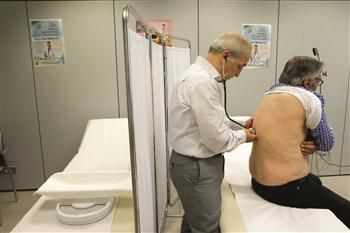Turkey, Facing Doctor Shortage, Invites Thousands Of Physicians From Economically Scarred Greece To Work In Hospitals

The Turkish health minister has come up with a novel way to help alleviate the shortage of medical professionals in his country, while concurrently easing the economic catastrophe in neighboring Greece: He wants to import 7,000 Greek doctors to Turkey.
Today’s Zaman, an English-language Turkish newspaper, reported that Health Minister Mehmet Müezzinoglu said educated professionals are desperate to flee Greece, which has been hammered by unemployment rate that now exceeds 27 percent.
“[We] need them,” the minister stated at a hospital opening ceremony in Istanbul. “Our doors are open to those 7,000 doctors from Greece. I invite those doctors to serve this country with their knowledge and experience.”
The health minister also commented on how Greece and Turkey have experienced vastly different economic fortunes in recent years.
“Turkey used to [look at] Greece as an example,” Müezzinoğlu said. “But since 2002, Turkey has begun to achieve far and far beyond what Greece succeeded [at doing].”
But Turkey is facing an acute shortage of doctors.
Today’s Zaman noted that there is only one doctor in Turkey for every 663 people – and excluding private facilities, that figure reaches the rate of 1,084 people for every doctor. (In contrast, in Switzerland, there is one doctor for about every 245 people, according to the Kaiser Family Foundation).
Müezzinoglu also said he wants Turkey to become a destination for “medical tourism,” and an influx of new physicians would facilitate such a goal.
“Given the figures for 2012, approximately 480,000 foreign nationals came to Turkey to receive [medical] treatment,” he said. “This year, the figure is up to 500,000. However, this number does not meet Turkey's potential. It is [only one-] quarter of what Turkey should see in terms of medical tourism. We will increase this figure [by] 25, 50 and 70 percent over the next five years.”
The general manager of the Health Ministry Health Services Department, İrfan Şencan, told the the Anadolu news agency that only 24 Greek doctors are currently employed in Turkish private hospitals.
“The medical education in Greece is close to Turkey’s standards. The private sector’s needs can be met by doctors who come from Greece,” Şencan said.
The Hurriyet Daily News of Turkey noted that a decree passed in October 2011 allowed for the employment of foreign doctors and nurses in Turkey. Regulations related to this passages required foreign physicians to acquire a residence and a work permit, as well as vocational liability insurance, and certificates of equivalence from relevant state offices to prove that their skills meet Turkish standards.
But some Turkish health care advocates oppose the minister’s entreaties.
Önder Kahveci, president of the Turkish Healthcare Workers' Union, said foreign doctors will likely serve at public hospitals, noting that most non-Turk physicians work in private facilities since they are not paid by public hospitals. He also noted that about 600 foreign doctors are at present working at private hospitals in the country.
“There is no need to bring Greek doctors to the country in addition to these 600 foreign doctors,” Kahveci said. “If the state is promising to provide foreign doctors with jobs, then it intends to clear the way for them to be employed in the public sector.”
Meanwhile, according to a report in the World Bulletin, the economic crisis has battered the Greek professional class, especially for scientists and health care personnel.
A report by the University of Thessaloniki warned that 120,000 professionals – including doctors, engineers and scientists -- have already exited Greece since 2010 in search of jobs in far-flung corners of the earth (but mostly to Germany and Britain), creating a middle-class brain drain.
"The number of young scientists emigrating has reached 10 percent of the country's potential, and that's very high," said the study’s director, Lois Lambrianides, a professor of economic geography at Thessaloniki.
© Copyright IBTimes 2024. All rights reserved.





















